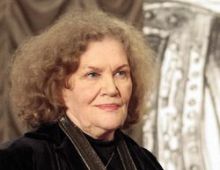In the highly read and penetrating, yet sadly underappreciated, lecture “Humanitarian Aura of the Nation or the Defect of the Core Mirror,” brilliant Lina Kostenko highlighted the distorted image of Ukrainians in the world (and even worse – in Ukraine itself). Misrepresenting our past doesn’t allow us to orient ourselves in the present, and actually deprives us of a sovereign future. She also singled out the necessity for immediately creating and tuning a platform which would reflect and spread the truth about Ukrainians. It would enable us to grasp our internal essence, not replicate a grotesque, and sometimes quite fraudulent stratification of myths. The main content of what this platform would ideally be transmitting is, in the opinion of the poetess, culture – the full-fledged Ukrainian culture which before, as a result of rude dissections, false interpretations and marginalizations almost didn’t exist in the consciousness of foreigners. The culture in the light of which history, politics, and other aspects of Ukrainian existence would naturally be transformed.
Today, after five years of uncertain but conscious searches for spiritual sovereignty we observe persistent attempts to restore the distorted image of Ukraine. Lina Kostenko’s message becomes topical as never before. The longing for the real, and the aversion to the profane and cynical, becomes a sign of time for those whose scales fell from their eyes (or who managed, as Andersen said, to remove from the eyes a splinter that “got into heart and the heart was transformed into a small piece of ice”). Last week Donetsk could satisfy this longing and join the vivifying Word of Lina Kostenko: within the framework of the program for creative youth support “Art without borders.” The cultural art project “Days of the creative works by Lina Kostenko in the Donetsk region” was dedicated to the jubilee of the poetess (the organizer was the House of workers of culture, with the assistance of the Department of education of the Donetsk city council). Actually, the essential content of the event was poetry by Lina Kostenko, recited from different stages by different performers: from pupils of schools and students to professional actors from Donetsk, Luhansk and Lviv.
The “Days” were opened with the contest of reciters “Poetry is always unique,” in which pupils and students of Donetsk educational establishments took part. “As a future ecologist,” told a laureate of the student contest, the third year student of Donetsk National Technical University Khrystyna Babukhina, “I was especially interested in poetry by Lina Kostenko about nature, which teaches that all living things on earth should be protected. She spreads a correct worldview and also inspires people to write their own poetry.” The universal character of the poetess really impresses. The poem recited by Khrystyna, Zhyttia ide i vse bez korektur (Life goes on and everything is the same), awakes ecological consciousness and provokes moral reflections about the world. Another poem Dolia (Fate) recited by the graduate student of the Donetsk National University Maria Kushmet (the grand prize of the contest) deals with conscious life, self-devotion, and vocation. Generally, the wide spectrum of creative works of the poetess encompassed by the competition participants enabled each of the people present to be filled with the healing energy of Ukrainian culture and feel how their thirsty souls blossom inside, growing in the reviving aura of the entire nation.
The concert “Looking into the eyes of centuries” became the culmination of the event. It impressed the audience not only by skillful performances of actors but also – and above all! – by the importance and deepness of the topics touched. Of course, perhaps the most convincing performance was by the actor of Zankovetska National Academic Drama Theatre (Lviv) Yurii Chekov, who covered the issue of nation and state in the poetry by Lina Kostenko. “This way one is approaching ruin. This way we are sticking to indigence. There is a struggle for Ukraine’s fate. All the rest is a big struggle for food,” like a thunder pronounced the actor – yet finishing in a whisper amidst the sonorous silence of the captivated audience: “And something aches in me, this something must be Ukraine.” “Ukrainians should use Lina Kostenko’s poetry as a guide,” – told Yurii to The Day after the end of the concert, “a purification and self-confession. For what is her poetry for each person above all? It moves, makes one think, not be indifferent. Lina Kostenko is called the soul of the nation, — it must be true. Obviously at present there is a need in this poetess, as once there was a need in Shevchenko. There is a need for poems and for what she expresses, for that secret code which is present in her poetry and herself.”
Actually, the absolute consonance and harmony of this poetry with Ukrainian nature was clearly demonstrated by performances of all participants of the concert: actresses of Luhansk Academic Music and Drama Theater Natalia Vahina, Marharyta Kolhanova, and Olesia Zabielina, the soloists of Donetsk Regional Philharmonic Society E. Shavlo and O. Marchenko, the vocal ensemble “Te Deum” (Donetsk school of arts), the vocal ensemble “Mriia” (Prokofyev Donetsk Music Academy), and the abovementioned laureates of the readers contest Maria Kushmet and Khrystyna Babukhina. The poem recited by Zabielina Balada moikh nochei (Ballad of my nights), was particularly memorable. It was dedicated to the fate of Don Quixote in a Ukrainian context: “My Don Quixote, knight, why do you ramble alone on this bitter path?”
The Days of Lina Kostenko in the Donetsk region were finished by the concert “Unriddled wonder” with the participation of students from Donetsk college of culture and the Center “Ukrainian bel canto” (Makiivka).







